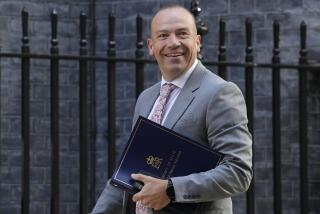All 15 North Ireland Protestants Now Out of British Parliament
- Share via
LONDON — All 15 Protestant members of the British Parliament from Northern Ireland have carried out threats to resign from the House of Commons after it approved an agreement Wednesday night giving the Irish Republic a formal consultative voice in the province.
The 15--two resigned Wednesday night and the remainder Thursday--said they will all seek reelection. Thus, province-wide elections likely to be held next January or February would be a referendum on the agreement, which they decry as a step toward Irish unification.
The 15 are members of Unionist parties that represent the 1-million Protestant majority who want Northern Ireland to remain British. The parties hold all but two of the 17 Northern Ireland seats.
The 650-seat House of Commons approved the measure 473 to 47, and later the Irish Senate in Dublin passed it 37 to 16, clearing the way for it to be registered with the United Nations and put into effect.
The agreement establishes an Anglo-Irish intergovernmental conference with a permanent secretariat that will give the Irish Republic a formal presence in the north to represent the interests of the minority half-million Catholics.
The first meeting of the conference is expected within two weeks.
British Prime Minister Margaret Thatcher and Irish Prime Minister Garret FitzGerald, the signatories of the Nov. 15 agreement, said they hope it will break a cycle of political violence and deadlock that has bedeviled Northern Ireland since Britain partitioned it from the south in 1921.
The First to Quit
Two Unionists, the Rev. Ian Paisley and Peter Robinson, were the first to tender their resignations by following parliamentary procedure and applying for nominal Crown jobs that bar them from membership in the House.
“My reason for this action is that I believe the Anglo-Irish agreement is an act of treachery to the people of Ulster, a surrender to the IRA (Irish Republican Army),” Paisley said.
Another prominent Unionist, Enoch Powell, accused Thatcher during the debate of giving way to pressure from the United States, where there is strong support for Irish reunification, and a promise of financial aid to bolster the new agreement.
Powell turned to Thatcher and said: “Let her not send for us to ask for whom the bell tolls--it tolls for her.”
Twenty members of Thatcher’s ruling Conservative Party joined the Unionists in voting against the accord.
More to Read
Sign up for Essential California
The most important California stories and recommendations in your inbox every morning.
You may occasionally receive promotional content from the Los Angeles Times.










